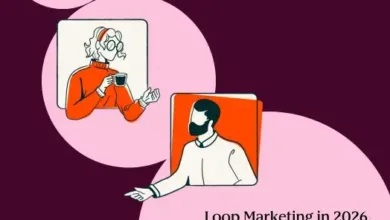Marketers Weigh In: HubSpot’s Loop Marketing Playbook Revealed

▼ Summary
– HubSpot introduced new products at an April 2025 Spotlight event in New York, breaking from its tradition of reserving such announcements for the Inbound Conference.
– The company declared its inbound marketing strategy dead after experiencing a significant drop in organic blog traffic in late 2024, largely due to AI-driven changes in user behavior.
– AI and large language models were blamed for inbound’s decline, as they provide direct answers instead of driving clicks to websites, reducing traffic flow.
– At the subsequent Inbound Conference, HubSpot unveiled Loop Marketing, a new strategy that adapts inbound principles to a landscape where buyers are less reliant on vendor websites.
– The marketing community’s reaction to Loop Marketing is mixed, with excitement from HubSpot insiders but criticism from others who see it as an overhyped continuation of high-volume content strategies.
The marketing world is watching closely as HubSpot introduces its new Loop Marketing playbook, a strategic pivot responding directly to the seismic shifts brought by artificial intelligence. This evolution comes at a time when traditional inbound methods face unprecedented challenges, making this new framework one of the most discussed topics among industry professionals.
Back in April 2025, HubSpot broke from tradition by hosting a Spotlight event in New York City, separate from its annual Inbound Conference. The atmosphere was tense; attendees knew something significant was brewing. For years, HubSpot had been the undisputed leader in inbound marketing, teaching businesses how to attract customers through valuable content and search visibility. But by late 2024, the model showed cracks, most strikingly, a sharp decline in organic traffic to the HubSpot blog itself.
The culprit, as identified by many, was the rapid adoption of AI-powered large language models. Instead of clicking through to websites, users began relying on LLMs to deliver instant answers, bypassing traditional funnels entirely. The very foundation of inbound, driving prospects to a site for conversion, was crumbling. In a bold admission, HubSpot representatives declared the classic inbound approach no longer viable.
Fast forward to last week’s Inbound Conference in San Francisco, where the company unveiled its response: Loop Marketing. This new framework aims to preserve the core strengths of inbound, educating customers, delivering value, and nurturing relationships, while adapting to a reality where buyers engage everywhere except brand-owned websites. The goal is to meet audiences across multiple channels, creating continuous, non-linear engagement loops rather than linear funnels.
Reactions from the marketing community have been varied. HubSpot employees and loyal users have expressed enthusiasm, viewing the Loop as a necessary evolution. Others, however, remain skeptical. Critics argue that the approach still leans too heavily on high-volume content production, performance analytics, and an unattainable ideal of marketing efficiency, flaws they believe have long plagued B2B strategies.
Some have already grown weary of the mounting hype, calling it another buzzphrase in a industry saturated with them. With the fall conference season just beginning, more new concepts are sure to emerge. Marketers would be wise to stay alert, the only constant in this field is change.
(Source: MarTech)





